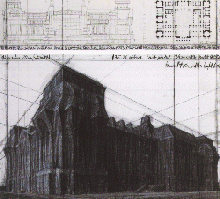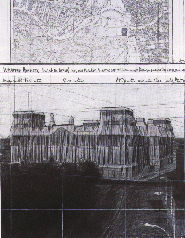

© 1995 Christo & Prestel Verlag
Interview with Christo
Interviewer: Masahiko Yanagi
Page 6 of 12
With friendly permission by Prestel Verlag

Drawing (two parts) 1992
Foto: Wolfgang Volz
Collection Jeanne-Claude Christo, New York
Yanagi:
To realize this project, from whom do you
have to obtain permission? Who has the right to
make the final decision?
Christo:
It is very intricate. Twenty-eight meters of the
East facade of the Reichstag are in the Soviet air
rights sector, but the upkeep of the building is
done by the West German government. It is almost
like an extension in Berlin of the Parliament of
Bonn. This is why all the money for the expenses of
the Reichstag is given by Bonn, not by the city of
Berlin. Juridically the person responsible, the
landlord for the Reichstag, is the President of the
Bundestag in Bonn, the Parliament of the German
Federal Republic, who in the American sense
would be something like the Vice President or the
Speaker of the House. He is the second person in
the political structure in West Germany. First there
is the President of Germany, then the President of
the Bundestag, and third the Chancellor. The
President of the Bundestag is the only one who can
give the final pemission because the Reichstag is
mostly in West Berlin. That is the so-called "official
way", but because the Reichstag is located in the
British military sector, the West German
government is obliged to ask the point of view of
the British who automatically pull together the
French and the Americans to discuss the okay or
refusal. Being also in divided Berlin the British,
Americans and the French are obliged to inform, or
discuss the East facade of the building with the
Soviet army headquarters in East Berlin, and of
course, the Soviets will be obliged on the other
hand to discuss the matter with the East German
government, whose capital is East Berlin. Now this
is how the thing is done.

Collage (two parts) 1992
Foto: Wolfgang Volz
Collection Jeanne-Claude Christo, New York
Yanagi:
In order to obtain permission, you've been
talking to many politicians of foreign governments.
Do you ever receive any assistance from the United
States government in negotiating with foreign
governments?
Christo:
Certainly for the project in Berlin, we tried, at
a difficult moment, to get some help from
Washington. This was our naive idea which did not
work very well. In the summer of 1977 we had the
first official refusal for the Reichstag project, and I
was terribly disappointed. The Running Fence was
completed, Carter had been elected, and at an
exhibition which I had in Washington at the
Corcoran Gallery, I asked Mrs. Mondale, who is a
friend of the arts, if Vice-President Mondale could
provide help for the project. But, ultimately we
discovered many months later that it did not help
anything. Then we understood that Germany is a
financial giant, but is often called a political
midget; Germany is not officially recognized as a
world power, like England or France, in political
negotiations. By being so powerful economically,
Germany has an incredible influence over eastern
European countries and the Soviet Union because
it is the biggest funnel of hard currency to the
Soviet bloc. West Germany uses Polish, Hungarian
or Czechoslovakian workers in the same way
America uses Hong Kong, South Korea and
Thailand: for cheap labor. All that makes the
leverage of the West German industrialists
extremely important. Instead of going to
Washington for help it is much better to have the
support of West German financiers, businessmen
and industrialists because of their strong influence
on the East bloc. This is why in 1978 we created the
Kuratorium für Christos Projekt Reichstag (Board
for Christo's Reichstag project) in Hamburg, made
up of thirteen leading West German citizens from
all kinds of fields, lawyers, businessmen, scientists,
industrialists and bankers, to help us to translate
my idea to Bonn and to the Soviet bloc. They really
do our work to bring about the understanding that
will lead to getting the permit. Also, in the
mid-'70s when things were going badly, just
before the refusal, we tried to go to the chief of the
American mission in Berlin, who is a civilian, and
to the French and the British, to ask them to give
some opinion or make some statement to
influence or encourage the West German
government to give permission. Unfortunately, the
Americans, the British and the French refused to
make any statement. They said that they would
await the decision in Bonn, and after that they
would give their opinion in a statement. We
learned later that the Allied forces would go along
with anything the West German government said.
That was our problem, not to have understood that
to build favorable support we should have worked
with these people simultaneously, before
approaching negotiations. Really that was the
biggest mistake.
Yanagi:
Although the Reichstag is physically located
in Berlin, permission can come only from Bonn.
Does this mean that people in Berlin have very
little influence on the decision to allow the
project ?
Christo:
The city of Berlin is not only a city, it is also a
state. The German Federal Republic is a federation
of states, such as the state of Bavaria. The mayor of
Berlin is like a governor, with his own ministers. It
creates a very unusual situation because Berlin, as a
city-state, has direct power, just like all the different
federal states represented in Bonn. It is also
obvious that since Berlin is the former capital of
Germany, the lordship or mayoralty of Berlin is
often a stepping stone to the Chancellory; the
mayor is always aspiring to become Chancellor or
President. Therefore the point of view of the mayor
towards my proposition is very important. We
knew that from the beginning, even before we ever
went to Bonn, and we tried to have the mayors of
Berlin, all five in succession, on our side. We are
unusually optimistic now because since February
of 1986, for the first time, we have the majority of
the Senators in favor of the project (the mayor of
Berlin has several senators, for industry, finance,
arts, building, police, etc.). We never before had so
great a majority and the mayor himself. This is why
we are very confident that the decision of the
Berlin Senate to support the project will be
significant to Bonn. In that way we can make Bonn
think much more seriously about our proposition.
Also, I should mention that right now there is a
group of German people, most of them without
relation to us, who are organizing a committee in
Berlin: Berliner f’r den Reichstag. They are
collecting signatures, they have tables in the
airport, the banks and in the streets, and they hope
to collect half-a-million signatures in Berlin by the
end of the year. They are young people and
students and businesspeople, all kinds. This is part
of the push that the people who are for the project
would like to make just before the final decision.




© 1995 Christo & Prestel Verlag







